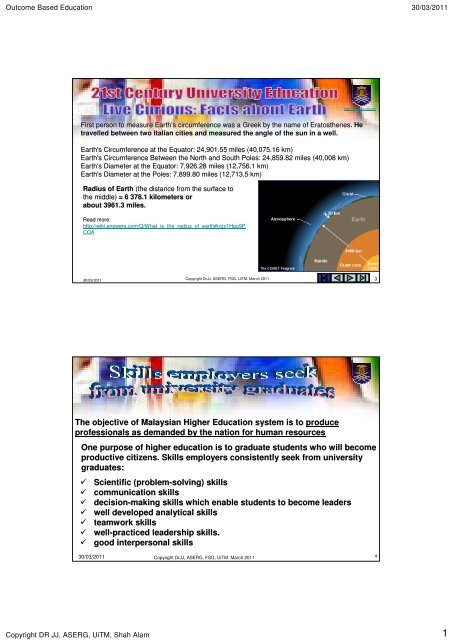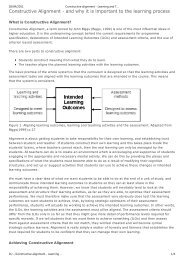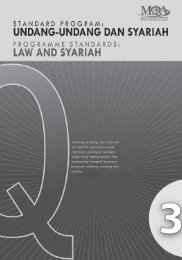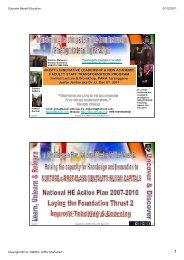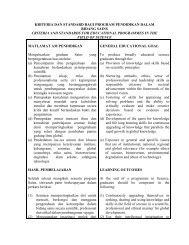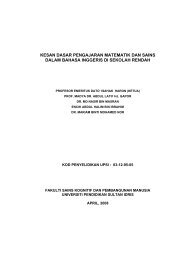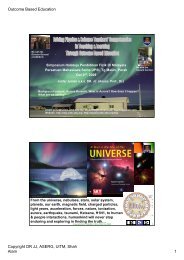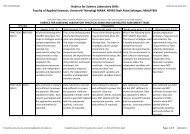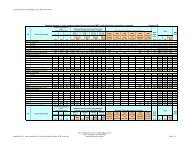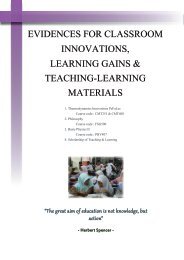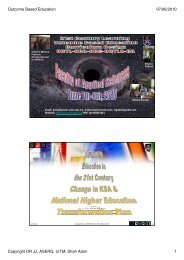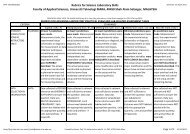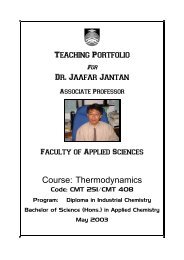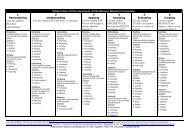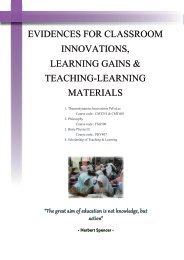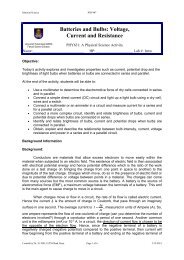DRJJ-PreKAP--PPT-color-01042011 (pdf) - UiTM
DRJJ-PreKAP--PPT-color-01042011 (pdf) - UiTM
DRJJ-PreKAP--PPT-color-01042011 (pdf) - UiTM
You also want an ePaper? Increase the reach of your titles
YUMPU automatically turns print PDFs into web optimized ePapers that Google loves.
Outcome Based Education 30/03/2011<br />
http://drjj.uitm.edu.my<br />
First person to measure Earth’s s circumference was a Greek by the name of Eratosthenes. He<br />
travelled between two Italian cities and measured the angle of the sun in a well.<br />
Earth's Circumference at the Equator: 24,901.55 miles (40,075.16 km)<br />
Earth's Circumference Between the North and South Poles: 24,859.82 82 miles (40,008 km)<br />
Earth's Diameter at the Equator: 7,926.28 miles (12,756.1 km)<br />
Earth's Diameter at the Poles: 7,899.80 miles (12,713.5 km)<br />
Radius of Earth (the distance from the surface to<br />
the middle) = 6 378.1 kilometers or<br />
about 3961.3 miles.<br />
Read more:<br />
http://wiki.answers.com/Q/What_is_the_radius_of_earth#ixzz1Hpo9P<br />
COA<br />
30/03/2011<br />
Copyright DrJJ, ASERG, FSG, <strong>UiTM</strong>. March 2011 3<br />
The objective of Malaysian Higher Education system is to produce<br />
professionals as demanded by the nation for human resources<br />
One purpose of higher education is to graduate students who will become<br />
productive citizens. Skills employers consistently seek from university<br />
graduates:<br />
Scientific (problem-solving) skills<br />
communication skills<br />
decision-making skills which enable students to become leaders<br />
well developed analytical skills<br />
teamwork skills<br />
well-practiced leadership skills.<br />
good interpersonal skills<br />
30/03/2011 Copyright DrJJ, ASERG, FSG, <strong>UiTM</strong>. March 2011 4<br />
Copyright DR JJ, ASERG, <strong>UiTM</strong>, Shah Alam 1
Outcome Based Education 30/03/2011<br />
Howard<br />
Gardner<br />
Copyright DrJJ, ASERG, FSG, <strong>UiTM</strong>. March 2011 5<br />
DrJJ, Zollman, Law, TS Zul<br />
http://drjj.uitm.edu.my<br />
Born & Raised in the state of Hang Jebat…<br />
Early education at St. David’s, Science Malacca & SDAR (Seremban)<br />
B.Sc. Physics (1983); M.Sc. Condensed Matter (1985) – Kansas St. Univ.<br />
Teaching Certificate (1986) – MPTI, Johor Bahru<br />
Served ITM – Jan 1987<br />
PhD Physics Education (1991-1994) - Kansas St. Univ.<br />
Physics & Education expert (Recipient of <strong>UiTM</strong>’s 2010 T&L Academic Award)<br />
Practiced OBE & Active Learning on my own since 1997.<br />
OBE, OBTL workshop speaker, facilitator & consultant at national level<br />
Vice-Chair Asian Physics Education Network (ASPEN), UNESCO<br />
Chair for ASPEN, Malaysia.<br />
Nominated for Innovative Teaching & Learning National & International<br />
Active Member, Science Educ. Committee, Academy Science Malaysia since 2005.<br />
Keynote, Plenary and Invited Speaker in Conferences Nationally & Internationally<br />
Copyright DrJJ, ASERG, FSG, <strong>UiTM</strong>. March 2011 6<br />
Copyright DR JJ, ASERG, <strong>UiTM</strong>, Shah Alam 2
Outcome Based Education 30/03/2011<br />
AIM: This half-day talk & workshop intends to provide you with an<br />
overview on the 21 st Century Outcomes-Based Curriculum Design &<br />
Assessment<br />
The objectives (what I plan to do) of this half-day workshop are:<br />
1. Describe the Malaysian Qualification Framework as the driving force for<br />
Outcomes-Based Education implementation in Malaysian Higher Education.<br />
2. Describe the characteristics of 21st Century Learning.<br />
3. Describe the Designing Backwards curriculum design in Outcomes-Based<br />
Education.<br />
4. Describe the Outcomes-Based Assessment & Grading in ensuring Constructive<br />
Alignment (CA) in Outcomes-Based Teaching & Learning (OBTL).<br />
Copyright DrJJ, ASERG, FSG, <strong>UiTM</strong>. March 2011 7<br />
AIM: This half-day talk & workshop intends to provide you with an<br />
overview on the 21st Century Outcomes-Based Curriculum Design &<br />
Assessment<br />
Learning Outcomes (what YOU will know and be able to do- this is your<br />
TAKE-AWAY AWAY for today)<br />
Upon successful completion of this workshop, you will be able to:<br />
1. Discuss the relevance of 21 st<br />
century learning to your current classroom<br />
practices. (LO1-C2)<br />
2. Explain the impact of Malaysian Qualification Framework on designing new<br />
curriculum. (LO1-C2)<br />
3. Discuss the Designing Down or Design Backwards in Outcomes-Based Education.<br />
(LO1-C2)<br />
4. Compare Outcomes-Based Assessment & Grading<br />
practices to traditional<br />
assessment practices. (LO3-C3)<br />
Copyright DrJJ, ASERG, FSG, <strong>UiTM</strong>. March 2011 8<br />
Copyright DR JJ, ASERG, <strong>UiTM</strong>, Shah Alam 3
Outcome Based Education 30/03/2011<br />
30/03/201<br />
1<br />
Copyright DrJJ, ASERG, FSG, <strong>UiTM</strong>. March 2011 9<br />
http://drjj.uitm.edu.my<br />
If you are, you breath.<br />
If you breath, you talk.<br />
If you talk, you ask.<br />
If you ask, you think.<br />
If you think, you search.<br />
If you search, you experience.<br />
If you experience, you learn.<br />
If you learn, you grow.<br />
If you grow, you wish.<br />
If you wish, you find.<br />
If you understand, you know.<br />
If you know, you want to know more…<br />
And if you want to know more,<br />
If you find, you doubt.<br />
If you doubt, you question.<br />
If you question, you understand.<br />
And if you want to know more, you are alive.<br />
Video courtesy of National Geographic Channel<br />
30/03/2011<br />
Copyright DrJJ, ASERG, FSG, <strong>UiTM</strong>. March 2011 10<br />
Copyright DR JJ, ASERG, <strong>UiTM</strong>, Shah Alam 4
Outcome Based Education 30/03/2011<br />
http://drjj.uitm.edu.my<br />
30/03/2011<br />
Copyright DrJJ, ASERG, FSG, <strong>UiTM</strong>. March 2011 11<br />
To promote confidence to the<br />
public;<br />
stakeholders (any group which has an interest in,<br />
involvement with, dependence on, contribution to, or<br />
is affected by, our graduates);<br />
that the quality of provision and standards of awards in<br />
higher education institutions (HEIs) are being safeguard<br />
and enhanced.<br />
30/03/201<br />
1<br />
Copyright DrJJ, ASERG, FSG, <strong>UiTM</strong>. March 2011 12<br />
Copyright DR JJ, ASERG, <strong>UiTM</strong>, Shah Alam 5
Outcome Based Education 30/03/2011<br />
• Point of reference & joint understanding of HE Qualifications in<br />
Malaysia<br />
• An instrument that<br />
• develops and classifies qualifications based on a set of criteria<br />
that are approved nationally and benchmarked against<br />
international best practices,<br />
• and which clarifies the earned academic levels, , learning<br />
outcomes of study areas and credit system based on student<br />
academic load (Student Learning Time, SLT).<br />
• These criteria are accepted and used for all qualifications awarded by<br />
recognised higher education providers. Hence, MQF integrates with<br />
and links all national qualifications.<br />
MQF<br />
30/03/201<br />
1<br />
Copyright DrJJ, ASERG, FSG, <strong>UiTM</strong>. March 2011 13<br />
Copyright DR JJ, ASERG, <strong>UiTM</strong>, Shah Alam 6
Outcome Based Education 30/03/2011<br />
MQF Framework for Diploma level-Outcomes: C3,P4, A3<br />
http://drjj.uitm.edu.my<br />
MQF<br />
30/03/201<br />
1<br />
Copyright DrJJ, ASERG, FSG, <strong>UiTM</strong>. March 2011 15<br />
MQF – Bachelors degree (Hons(<br />
Hons.)<br />
– C4, P4, A3<br />
http://drjj.uitm.edu.my<br />
MQF<br />
30/03/201<br />
1<br />
Copyright DrJJ, ASERG, FSG, <strong>UiTM</strong>. March 2011 16<br />
Copyright DR JJ, ASERG, <strong>UiTM</strong>, Shah Alam 7
Outcome Based Education 30/03/2011<br />
To implement MQF as a reference point for Malaysian<br />
Qualifications<br />
To develop standards and criteria and all other relevant<br />
instruments as national references for the conferment of<br />
awards with the cooperation of stakeholders<br />
To assure quality of HEIs and programmes<br />
To accredit courses that fullfill the set criteria and standards<br />
To facilitate the recognition and articulation of qualifications<br />
To maintain the Malaysian Qualification Register (MQR)<br />
30/03/201<br />
1<br />
Copyright DrJJ, ASERG, FSG, <strong>UiTM</strong>. March 2011 17<br />
MQA Code of Practice<br />
Good Practices:<br />
MQA<br />
Code of<br />
Practice<br />
MQA<br />
Self-study<br />
Report 30/03/201<br />
1<br />
….the quality assurance process is built on the following<br />
attributes:<br />
encourages a variety of teaching and learning methods<br />
ensures the choice of credible student assessment<br />
methods appropriate for the teaching and learning methods<br />
chosen;<br />
ensures there are adequate resources to deliver the<br />
curriculum;<br />
is concerned with good outcomes rather than detailed<br />
specifications of content<br />
Copyright DrJJ, ASERG, FSG, <strong>UiTM</strong>. March 2011 18<br />
Copyright DR JJ, ASERG, <strong>UiTM</strong>, Shah Alam 8
Outcome Based Education 30/03/2011<br />
MQA<br />
Code of<br />
Practice<br />
30/03/2011 Copyright DrJJ, ASERG, FSG, <strong>UiTM</strong>. March 2011 19<br />
30/03/2011 Copyright DrJJ, ASERG, FSG, <strong>UiTM</strong>. March 2011 20<br />
Copyright DR JJ, ASERG, <strong>UiTM</strong>, Shah Alam 9
Outcome Based Education 30/03/2011<br />
http://drjj.uitm.edu.my<br />
30/03/2011 Copyright DrJJ, ASERG, FSG, <strong>UiTM</strong>. March 2011 21<br />
Developing 3 Domains of Education-Learn<br />
Affective<br />
Heart<br />
Feeling, The Heart<br />
The CARE, Emotions<br />
Cognitive<br />
Head<br />
Knowing, the Head<br />
The KNOWLEDGE (F,C,P)<br />
Intellectual Skills (FC)<br />
http://drjj.uitm.edu.my<br />
Psychomotor<br />
Hand, Body<br />
Doing, The Hand<br />
The SKILLS<br />
(3+1)H<br />
30/03/2011<br />
Copyright DrJJ, ASERG, FSG, <strong>UiTM</strong>. March 2011 22<br />
Copyright DR JJ, ASERG, <strong>UiTM</strong>, Shah Alam 10
Outcome Based Education 30/03/2011<br />
http://drjj.uitm.edu.my<br />
Learning is<br />
what students know (factual, conceptual, procedural &<br />
metacognitive knowledge).<br />
what they can do with what they know (functional knowledge)<br />
Knowledge, skills, and attitudes.<br />
The 21 st Century MUST HAVE skills:<br />
“Learning should be relevant to the variety of graduates<br />
‘roles included in their working, civic and personal life.”<br />
“It is an emphasis on what students can do with knowledge,<br />
rather than what units of knowledge they have, , that best<br />
describes the essence of 21st century skills.”<br />
Elena Silva in the Education Sector Report 2008<br />
30/03/2011<br />
Copyright DrJJ, ASERG, FSG, <strong>UiTM</strong>. March 2011 23<br />
http://drjj.uitm.edu.my<br />
“A university is an institution that provides experiences for intense interaction<br />
between students & teachers” – Syed Naquib quoted by Deputy Minister of<br />
HE at the opening of EDUCATE conference, Nikko Hotel, Oct 7 th , 2010<br />
One of the most important goals of a university is to develop<br />
individuals who have advanced literacy skills in<br />
their discipline: people who can participate effectively<br />
by critiquing information and ideas and by contributing with<br />
rigour and creativity to new insights and knowledge,<br />
who are self-aware as learners, and who are rhetorically<br />
versatile, confident communicators able to adapt and<br />
contribute to the demands of employment and life in a<br />
changing society and wider world.<br />
30/03/2011<br />
Copyright DrJJ, ASERG, FSG, <strong>UiTM</strong>. March 2011 24<br />
Copyright DR JJ, ASERG, <strong>UiTM</strong>, Shah Alam 11
Outcome Based Education 30/03/2011<br />
http://drjj.uitm.edu.my<br />
Can explain: provide thorough, supported, and justifiable accounts<br />
of phenomena, facts, and data.<br />
Can interpret: tell meaningful stories; offer apt translations; provide<br />
a revealing historical or personal dimension to ideas and events;<br />
make it personal or accessible through images, anecdotes,<br />
analogies, and models.<br />
Can apply: effectively use and adapt what we know in diverse<br />
contexts.<br />
Have perspective: see and hear points of view through critical eyes<br />
and ears; see the big picture.<br />
Source: Grant Wiggins and Jay McTighe. Understanding by Design; Chap 4.<br />
30/03/2011<br />
Copyright DrJJ, ASERG, FSG, <strong>UiTM</strong>. March 2011 25<br />
http://drjj.uitm.edu.my<br />
Sternberg suggests Curriculum must develop the other 3 R’s.<br />
• Reasoning<br />
• which include analytical, critical thinking, and problem solving skills<br />
• Resilience<br />
• which encompasses life skills such as flexibility, adaptability, and<br />
self-reliance<br />
• Responsibility<br />
• wisdom, which he defines as “the application of intelligence,<br />
creativity, and knowledge for a common good.”<br />
Sternberg, R. & Subotnik, R., eds. (2006). Optimizing Student Success with the Other Three Rs:<br />
Reasoning, Resilience, and Responsibility. Greenwich, CT: Information Age Publishing.<br />
30/03/2011<br />
Copyright DrJJ, ASERG, FSG, <strong>UiTM</strong>. March 2011 26<br />
Copyright DR JJ, ASERG, <strong>UiTM</strong>, Shah Alam 12
Outcome Based Education 30/03/2011<br />
30/03/2011 Copyright DrJJ, ASERG, FSG, <strong>UiTM</strong>. March 2011 27<br />
30/03/2011 Copyright DrJJ, ASERG, FSG, <strong>UiTM</strong>. March 2011 28<br />
Copyright DR JJ, ASERG, <strong>UiTM</strong>, Shah Alam 13
Outcome Based Education 30/03/2011<br />
30/03/2011<br />
Copyright DrJJ, ASERG, FSG, <strong>UiTM</strong>. March 2011 29<br />
http://drjj.uitm.edu.my<br />
Copyright DrJJ, ASERG, FSG, <strong>UiTM</strong>. March 2011 30<br />
Copyright DR JJ, ASERG, <strong>UiTM</strong>, Shah Alam 14
Outcome Based Education 30/03/2011<br />
http://drjj.uitm.edu.my<br />
30/03/2011<br />
Copyright DrJJ, ASERG, FSG, <strong>UiTM</strong>. March 2011 31<br />
All engineers have in common the work they do: applying<br />
scientific knowledge to solve technical problems and develop<br />
products and services that benefit society.<br />
For example, electrical and electronics engineers conduct<br />
research, and design, develop, test, and oversee the<br />
development of electronic systems and the manufacture of<br />
electrical and electronic equipment and devices. From the<br />
global positioning system that can continuously provide the<br />
location of a vehicle to giant electric power generators,<br />
electrical and electronics engineers are responsible for a wide<br />
range of technologies.<br />
The core curriculum builds on a foundation of basic courses in<br />
calculus, physics, chemistry, and the humanities.<br />
GE<br />
ABET<br />
30/03/2011 Copyright DrJJ, ASERG, FSG, <strong>UiTM</strong>. March 2011 32<br />
Copyright DR JJ, ASERG, <strong>UiTM</strong>, Shah Alam 15
Outcome Based Education 30/03/2011<br />
http://drjj.uitm.edu.my<br />
30/03/2011<br />
Copyright DrJJ, ASERG, FSG, <strong>UiTM</strong>. March 2011 33<br />
http://drjj.uitm.edu.my<br />
Transformation Framework<br />
Institutional Pillars<br />
Critical Agenda<br />
Human Capital with<br />
First-class Mentality<br />
Governance<br />
Leadership<br />
Academia<br />
Teaching and<br />
Learning<br />
Research and<br />
Development<br />
Apex<br />
Universities<br />
MyBrain15<br />
Lifelong<br />
Learning<br />
Academic<br />
Performance<br />
Audit<br />
Graduate<br />
Training<br />
Scheme<br />
Source: National Higher Education Action Plan 2007-2010<br />
Copyright DrJJ, ASERG, FSG, <strong>UiTM</strong>. March 2011 34<br />
Copyright DR JJ, ASERG, <strong>UiTM</strong>, Shah Alam 16
Outcome Based Education 30/03/2011<br />
http://drjj.uitm.edu.my<br />
Outcomes-Based<br />
Interdisciplinary<br />
Project-based<br />
Research-driven<br />
Thematic & NOT textbook-driven<br />
(textbook as a resource)<br />
Connected to community<br />
Incorporates<br />
Bloom’s s HOTS<br />
Multiple Intelligences<br />
Learning Preferences<br />
Technology & multimedia<br />
Multiple literacies<br />
Authentic Assessment (tasks)<br />
Students work independently &<br />
interdependently<br />
Knowledge is<br />
constructed through research<br />
and application, and connected<br />
to previous knowledge, personal<br />
experience, , interests, talents<br />
and passions<br />
is NOT memorization of facts<br />
Assessment is<br />
demonstration of understanding<br />
through application in a variety<br />
of contexts<br />
NOT REGURGITATION<br />
By self, peer & facilitators<br />
By multiple ATs to show<br />
achievement of CLOs<br />
By using holistic rubrics<br />
30/03/2011<br />
Copyright DrJJ, ASERG, FSG, <strong>UiTM</strong>. March 2011 35<br />
http://drjj.uitm.edu.my<br />
"Learning outcomes represent<br />
culminating demonstrations of learning and<br />
achievement.<br />
They are not simply a listing of discrete skills, nor broad<br />
statements of knowledge and comprehension.<br />
They describe performances that demonstrate<br />
that significant learning has been verified and<br />
achieved by graduates of the program."<br />
30/03/2011<br />
Copyright DrJJ, ASERG, FSG, <strong>UiTM</strong>. March 2011 36<br />
Copyright DR JJ, ASERG, <strong>UiTM</strong>, Shah Alam 17
Outcome Based Education 30/03/2011<br />
http://drjj.uitm.edu.my<br />
The Outcomes-Based approach to course design is intended to<br />
make the expectations of the designer/educator<br />
more transparent to both the student and any<br />
regulatory or accrediting body (KPT, MQA, EAC).<br />
Unlike the traditional model of course design in higher<br />
education (focus on coverage), where the lecturer would decide<br />
what to include on a syllabus, based on his or her own<br />
judgement of what was important for students to know; or on<br />
personal research or other interests;<br />
the outcomes-based approach starts with a specification of what<br />
the student will be expected to achieve by the end of the<br />
program/course/unit/lesson<br />
/lesson<br />
30/03/2011<br />
Copyright DrJJ, ASERG, FSG, <strong>UiTM</strong>. March 2011 37<br />
1. Clarity of focus about outcomes<br />
Always have the significant, culminating exit outcomes as the<br />
focus.<br />
Let the students know what they are aiming for.<br />
2. Designing backwards<br />
Design curriculum backward by using the major outcomes as<br />
the focus and linking all planning, teaching and assessment<br />
decisions directly to these outcomes<br />
CMAP-S<br />
CMAP-EDU<br />
CMAP-A<br />
CMAP-M<br />
Copyright DrJJ, ASERG, FSG, <strong>UiTM</strong>. March 2011 38<br />
Copyright DR JJ, ASERG, <strong>UiTM</strong>, Shah Alam 18
Outcome Based Education 30/03/2011<br />
3. Consistent, high expectations of success<br />
Set the expectation that OBE is for ALL learners.<br />
Expect students to succeed by providing them encouragement to<br />
engage deeply with the issues they are learning and to achieve the<br />
high challenging standard set (Spady, 1994b).<br />
4. Expanded opportunity<br />
Develop curriculum to give scope to every learner to learn in<br />
his/her own pace.<br />
Cater for individual needs and differences, for example,<br />
expansion of available time and resources so that all students<br />
succeed in reaching the exit outcomes.<br />
Copyright DrJJ, ASERG, FSG, <strong>UiTM</strong>. March 2011 39<br />
Traditional/Transitional OBE emphasises student mastery of<br />
traditional subject-related academic outcomes (usually with a strong<br />
focus on subject-specific specific content) and some cross-discipline<br />
outcomes (such as the ability to solve problems or to work co-<br />
operatively).<br />
Transformational OBE emphasises long-term, cross-curricular<br />
curricular<br />
outcomes that are related directly to students’ future life roles (such<br />
as being a productive worker or a responsible citizen or a parent).<br />
Spady (1994)<br />
Source: Killen, Roy (2005). Programming and assessment for quality teaching and<br />
learning. Chapter 2. Thomson Social Science Press<br />
Copyright DR JJ, ASERG, <strong>UiTM</strong>, Shah Alam 19
Outcome Based Education 30/03/2011<br />
http://drjj.uitm.edu.my<br />
General (not<br />
directly<br />
measurable)<br />
MOHE<br />
Institutional Attributes<br />
Program level (Still general)<br />
Very general (not<br />
measurable)<br />
General (not<br />
directly<br />
measurable)<br />
Course Level (Specific but not directly measurable)<br />
Lesson Level (Very specific & MUST be measurable)<br />
30/03/2011<br />
Copyright DrJJ, ASERG, FSG, <strong>UiTM</strong>. March 2011 41<br />
http://drjj.uitm.edu.my<br />
MQF LOs Domains MOHE LOs, 2009<br />
i. Knowledge<br />
ii. Practical skills<br />
iii. Social skills and responsibilities<br />
iv. Ethics, professionalism and<br />
humanities<br />
v. Communication, leadership and<br />
team skills<br />
vi. Scientific methods, critical thinking<br />
and problem solving skills<br />
vii. Lifelong learning and information<br />
management<br />
viii. Entrepreneurship and managerial<br />
skills<br />
1. Knowledge (K)<br />
2. Practical Skills (S)<br />
3. Thinking and scientific skills (K)<br />
4. Communication skills (A/S)<br />
5. Social skills, teamwork and responsibility<br />
(A/S)<br />
6. Values, ethics, moral and professionalism (A)<br />
7. Information management and lifelong learning<br />
skills (S/A)<br />
8. Managerial and entrepreneurial skills (S)<br />
9. Leadership skills (S/A)<br />
30/03/2011<br />
Copyright DrJJ, ASERG, FSG, <strong>UiTM</strong>. March 2011 42<br />
Copyright DR JJ, ASERG, <strong>UiTM</strong>, Shah Alam 20
Outcome Based Education 30/03/2011<br />
http://drjj.uitm.edu.my<br />
<strong>UiTM</strong>’s VISION<br />
To establish <strong>UiTM</strong> as a premier university of outstanding scholarship and academic excellence<br />
capable of providing leadership to Bumiputeras’ dynamic involvement in all professional fields<br />
of world-class standards in order to produce globally competitive graduates of sound ethical<br />
standing.<br />
Mission<br />
To enhance the knowledge and expertise of Bumiputeras in all fields of study through professional<br />
programmes, research work and community service based on moral values and professional<br />
ethics.<br />
Programme Educational Objectives are specific goals consistent with the<br />
mission and vision of the IHL, contains the 9 MOHE attributes, responsive to the<br />
expressed interest of programme stakeholders and describing the expected<br />
achievements or milestone of graduates in their career and professional life few<br />
years after graduation. PEOs are employability attributes and selling points of<br />
your program. The sentences begin with: Three to five years upon successful<br />
completion the program, our graduates will be….<br />
EAC ABET WA<br />
Copyright DrJJ, ASERG, FSG, <strong>UiTM</strong>. March 2011 43<br />
http://drjj.uitm.edu.my<br />
30/03/2011<br />
Copyright DrJJ, ASERG, FSG, <strong>UiTM</strong>. March 2011 44<br />
Copyright DR JJ, ASERG, <strong>UiTM</strong>, Shah Alam 21
Outcome Based Education 30/03/2011<br />
http://drjj.uitm.edu.my<br />
ABET’s s definition of PEOs:<br />
The program must have published Program Educational Objectives that are<br />
consistent with the mission of the institution, the needs of the<br />
program’s s various constituencies, and these criteria.<br />
There must be a documented and effective process, involving program<br />
constituencies, for the periodic review and revision of these program<br />
educational objectives.<br />
EAC’s definition<br />
Programme Objectives are specific goals consistent with the mission<br />
and vision of the IHL, that are responsive to the expressed interest of<br />
programme stakeholders, describing the expected achievements of<br />
graduates in their career and professional life few years after<br />
graduation.<br />
EAC ABET WA Copyright DrJJ, ASERG, FSG, <strong>UiTM</strong>. March 2011 45<br />
http://drjj.uitm.edu.my<br />
TCM Health EAC Eng Tech ABET WA<br />
Generic Program Educational Objectives (PEOs are employability attributes and selling<br />
points of your program) for FSG Diploma Programs. The sentences begin with<br />
Three to five years upon successfully completing the program, our graduates will be:<br />
1. semiprofessionals in applied sciences who analyze and apply the knowledge,<br />
understanding and laboratory experiences to provide quality products and services to<br />
the government agencies and science-related industries.<br />
2. semiprofessionals in applied sciences who lead and engage in teams in problem<br />
solving tasks across disciplines through effective communicative abilities<br />
3. semiprofessionals in applied sciences who continue to advance their knowledge and<br />
abilities by utilizing ICT to explore business opportunities in the science-related<br />
industry<br />
4. semiprofessionals in applied sciences who practice ethical and professional values in<br />
providing services to the recipients and provider of the science-related industry.<br />
Task<br />
Copyright DrJJ, ASERG, FSG, <strong>UiTM</strong>. March 2011 46<br />
Copyright DR JJ, ASERG, <strong>UiTM</strong>, Shah Alam 22
Outcome Based Education 30/03/2011<br />
TCM Health EAC Eng Tech ABET WA<br />
http://drjj.uitm.edu.my<br />
Generic Program Learning Outcomes (PLOs are what graduates will know and be able to<br />
do to attain PEOs) for FSG Degree Programs. The sentences begin with<br />
Upon successful completion of the program, our bumiputra graduates will be able to:<br />
1. apply and acquire knowledge and understanding of laws, theories and principles of<br />
science and mathematics. (LO1)<br />
2. safely prepare samples and operate a range of machineries and laboratory equipments.<br />
(LO2)<br />
3. conduct experiments, process, interpret and analyze experimental data. (LO2)<br />
4. apply the scientific reasoning in solving authentic problems. (LO3)<br />
5. verbally communicate scientific ideas with experts and non-experts. (LO4)<br />
6. articulate scientific investigations in written form. (LO4)<br />
7. effectively engage in a multidisciplinary team. (LO5)<br />
8. apply values, ethics, morality and professionalism in their scientific pursuit. (LO6)<br />
9. manage information and engage in life-long learning. (LO7)<br />
10.apply managerial and entrepreneurial skills. (LO8)<br />
11.demonstrate leadership skills. (LO9)<br />
Copyright DrJJ, ASERG, FSG, <strong>UiTM</strong>. March 2011 47<br />
http://drjj.uitm.edu.my<br />
Copyright DrJJ, ASERG, FSG, <strong>UiTM</strong>. March 2011 48<br />
Copyright DR JJ, ASERG, <strong>UiTM</strong>, Shah Alam 23
Outcome Based Education 30/03/2011<br />
Bloom Cognitive<br />
Action Verbs<br />
Bloom<br />
3/30/2011 Copyright DrJJ, ASERG, FSG, <strong>UiTM</strong>. March 2011 49<br />
Bloom<br />
30/03/2011 Copyright DrJJ, ASERG, FSG, <strong>UiTM</strong>. March 2011 50<br />
Copyright DR JJ, ASERG, <strong>UiTM</strong>, Shah Alam 24
Outcome Based Education 30/03/2011<br />
LO:<br />
What the<br />
students are able<br />
to know & do<br />
Teaching:<br />
Getting the<br />
students be able<br />
to know & do<br />
Assessment:<br />
How well has<br />
the students<br />
know &<br />
have done<br />
30/03/2011<br />
Copyright DrJJ, ASERG, FSG, <strong>UiTM</strong>. March 2011 51<br />
“The principle goal of education is to create men who are<br />
capable of doing new things, not simply of repeating what other<br />
generations have done -- men who are creative, inventive and<br />
discoverers” Jean Piaget<br />
“Teachers are powerful people and keepers of the future. Help<br />
your students dream big!” Leslie Owen Wilson<br />
Copyright DrJJ, ASERG, FSG, <strong>UiTM</strong>. March 2011 52<br />
Copyright DR JJ, ASERG, <strong>UiTM</strong>, Shah Alam 25
Outcome Based Education 30/03/2011<br />
http://drjj.uitm.edu.my<br />
30/03/2011 Copyright DrJJ, ASERG, FSG, <strong>UiTM</strong>. March 2011 53<br />
Copyright DrJJ, ASERG, FSG, <strong>UiTM</strong>. March 2011 54<br />
Copyright DR JJ, ASERG, <strong>UiTM</strong>, Shah Alam 26
Outcome Based Education 30/03/2011<br />
http://drjj.uitm.edu.my<br />
30/03/2011 Copyright DrJJ, ASERG, FSG, <strong>UiTM</strong>. March 2011 55<br />
http://drjj.uitm.edu.my<br />
Defined in this manner, assessment asks you to think about the following<br />
questions:<br />
What should students be learning and in what ways should they be<br />
growing<br />
What are students actually learning and in what ways are they actually<br />
growing<br />
What should you be doing to facilitate student learning and growth<br />
30/03/2011 Copyright DrJJ, ASERG, FSG, <strong>UiTM</strong>. March 2011 56<br />
Copyright DR JJ, ASERG, <strong>UiTM</strong>, Shah Alam 27
Outcome Based Education 30/03/2011<br />
To many, the word “assessment” simply means the process by<br />
which we assign students grades. Assessment is much more<br />
than this, however.<br />
Assessment is a mechanism for providing instructors with<br />
data for improving their teaching methods and for guiding<br />
and motivating students to be actively involved in their<br />
own learning.<br />
As such, assessment provides important feedback to both<br />
instructors and students.<br />
SOURCE: Excerpted from National Institute for Science Education (2001b)<br />
30/03/2011 Copyright DrJJ, ASERG, FSG, <strong>UiTM</strong>. March 2011 57<br />
Assessment gives us essential information about what our<br />
students are learning and about the extent to which we<br />
are meeting our teaching goals.<br />
But the true power of assessment comes in also using it to give<br />
feedback to our students. Improving the quality of<br />
learning in our courses involves not just determining to what<br />
extent students have mastered course content at the end of<br />
the course; improving the quality of learning also involves<br />
determining to what extent students are mastering<br />
content throughout the course.<br />
SOURCE: Excerpted from National Institute for Science Education (2001b)<br />
30/03/2011 Copyright DrJJ, ASERG, FSG, <strong>UiTM</strong>. March 2011 58<br />
Copyright DR JJ, ASERG, <strong>UiTM</strong>, Shah Alam 28
Outcome Based Education 30/03/2011<br />
In OBTL, assessment is<br />
Judging and grading how well the CLOs have been achieved by<br />
students.<br />
the contextual factor which most strongly affects how students<br />
learn.<br />
THE curriculum for students<br />
drives how students learn.<br />
OBTL is criterion-referenced (CRA) in that the CLOs supply the criteria<br />
for the assessment tasks. The difference between OBTL and traditional<br />
CRA is in how students’ grades are determined.<br />
30/03/2011 Copyright DrJJ, ASERG, FSG, <strong>UiTM</strong>. March 2011 59<br />
1. In OBTL, assessment is about making a judgement and providing a<br />
grade to how well the CLOs have been achieved – Outcomes-based<br />
based.<br />
2. Designed to align with the CLOs to be assessed – Constructive<br />
Alignment.<br />
3. Assessment tasks are selected to provide the means for students to<br />
present evidence of their learning and achievement of the CLOs.<br />
4. Student performance is judged on evidence of achievement of the<br />
CLOs (criteria) presented in the assessment task - criterion-referenced<br />
referenced.<br />
30/03/2011 Copyright DrJJ, ASERG, FSG, <strong>UiTM</strong>. March 2011 60<br />
Copyright DR JJ, ASERG, <strong>UiTM</strong>, Shah Alam 29
Outcome Based Education 30/03/2011<br />
1. Grading should be outcomes based (OBG(<br />
OBG). Grades are awarded to<br />
reflect the level of understanding /performance achieved in relation to<br />
the ILOs to be assessed.<br />
2. It is important to remember that it is the students' achievement of the<br />
LLOs (CLOs) that is to be assessed and graded not their performance<br />
on the assessment tasks themselves.<br />
3. Feedback should be specific to the LLOs (CLOs) to enhance learning.<br />
30/03/2011 Copyright DrJJ, ASERG, FSG, <strong>UiTM</strong>. March 2011 61<br />
Traditional<br />
Summative<br />
Norm-referenced<br />
Decontextualized<br />
(unauthentic)<br />
Measurement Model<br />
OBA<br />
Formative<br />
Criterion-referenced<br />
referenced<br />
Contextualized<br />
(authentic)<br />
Standards Model<br />
30/03/2011 Copyright DrJJ, ASERG, FSG, <strong>UiTM</strong>. March 2011 62<br />
Copyright DR JJ, ASERG, <strong>UiTM</strong>, Shah Alam 30
Outcome Based Education 30/03/2011<br />
Different methods of assessment assess different learning outcomes.<br />
A range of different methods of assessment may be required to address dress the<br />
range of CLOs of a course<br />
Questions to be asked in selecting assessment methods:<br />
1. What CLOs are to be assessed<br />
2. Are the assessment methods concerned able to address those CLOs<br />
3. Will the assessment methods encourage students to relate to real-life<br />
life<br />
contexts Are they authentic<br />
4. Are the assessment methods practicable with respect to time<br />
allowance and available resources<br />
5. Taking the course as a whole, will the different assessment methods<br />
offer a balanced assessment of all the course CLOs<br />
6. Is the assessment workload realistic for teachers and students<br />
30/03/2011 Copyright DrJJ, ASERG, FSG, <strong>UiTM</strong>. March 2011 63<br />
http://drjj.uitm.edu.my<br />
Assessing declarative<br />
knowledge:<br />
Essay examinations<br />
Multiple choice questions<br />
Open-book examinations<br />
Closed-book examinations<br />
Tests and quizzes<br />
Assignments<br />
Ordered outcome items<br />
Letter to a friend<br />
Presentations<br />
Assessing functioning<br />
knowledge:<br />
Projects (individual)<br />
Projects (group)<br />
Portfolios<br />
Practicums<br />
Laboratories<br />
Reflective journals<br />
Case studies<br />
Presentations<br />
Assignments<br />
Rapid assessments<br />
methods (for large<br />
classes):<br />
Concept maps<br />
Venn diagrams<br />
Three-minute essays<br />
Gobbets (artifacts)<br />
Source: Biggs & Tang (2007). “Teaching for Quality Learning at University”. Third Edition. McGraw Hill Companies.<br />
30/03/2011 Copyright DrJJ, ASERG, FSG, <strong>UiTM</strong>. March 2011 64<br />
Copyright DR JJ, ASERG, <strong>UiTM</strong>, Shah Alam 31
Outcome Based Education 30/03/2011<br />
30/03/2011 Copyright DrJJ, ASERG, FSG, <strong>UiTM</strong>. March 2011 65<br />
SYLL<br />
Test<br />
Lab<br />
A “C” student’s s response could be:<br />
Forces are agents of change. Physically, a force can be<br />
visually observed as changing the position of a stationary<br />
object or changing either the speed or the direction or<br />
both if the object was initially in motion.<br />
An “A” student’s s response: As<br />
like a “C” student plus<br />
Newton’s laws of motion best<br />
describes how these changes<br />
occur. In fact, he asserts that<br />
forces cause an object’s<br />
position and hence its speed to<br />
change. Prolong and constant<br />
exertion of the force will cause<br />
a constant change of its speed<br />
or direction or both. But in the<br />
world of atoms and subatomic<br />
particles, Newton’s laws begin<br />
to breakdown especially at<br />
speeds close to the speed of<br />
light… In addition to visible<br />
forces, invisible forces also<br />
exist. …. & more<br />
30/03/2011 Copyright DrJJ, ASERG, FSG, <strong>UiTM</strong>. March 2011 66<br />
Copyright DR JJ, ASERG, <strong>UiTM</strong>, Shah Alam 32
Outcome Based Education 30/03/2011<br />
http://drjj.uitm.edu.my<br />
Copyright DrJJ, ASERG, FSG, <strong>UiTM</strong>. March 2011 67<br />
http://drjj.uitm.edu.my<br />
Copyright DrJJ, ASERG, FSG, <strong>UiTM</strong>. March 2011 68<br />
Copyright DR JJ, ASERG, <strong>UiTM</strong>, Shah Alam 33
ERROR: undefined<br />
OFFENDING COMMAND: f‘~<br />
STACK:


